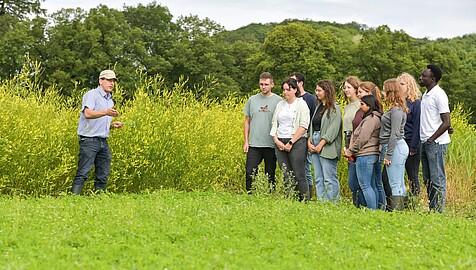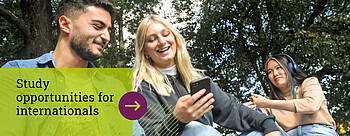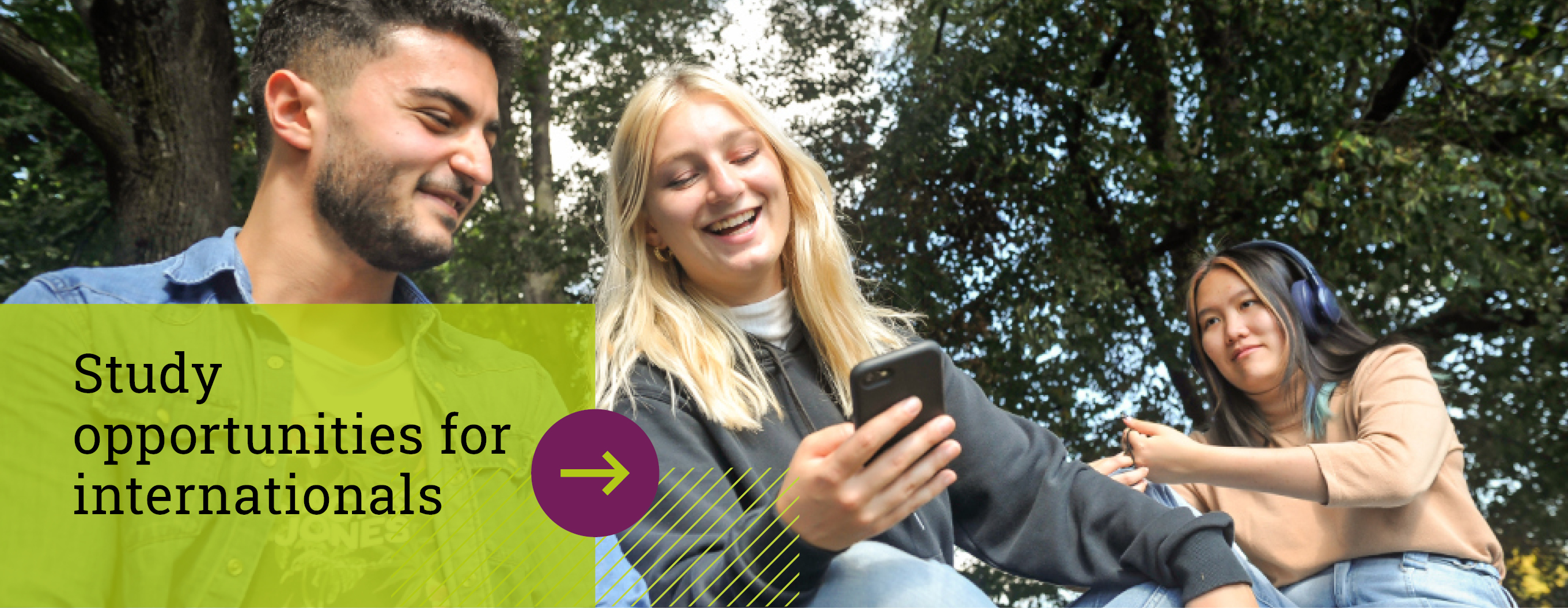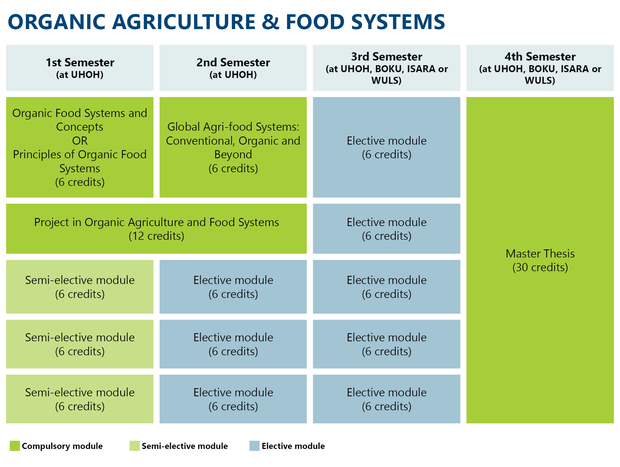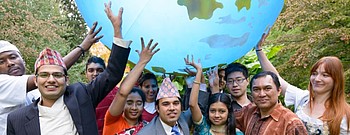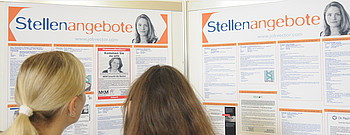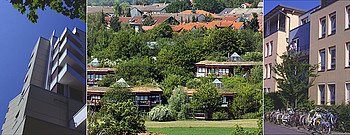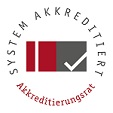Organic Agriculture and Food Systems (Master’s)
International Master’s Program in Organic Agriculture
Organic Agriculture and Food Systems (Master’s)
International Master’s Program in Organic Agriculture
The Organic Agriculture and Food Systems degree program is right for you if you are interested in the sustainable, ecological, and ethical production of food as well as its cultivation, processing, and quality assurance. You can gain a transdisciplinary or interdisciplinary insight into organic farming, depending on your taste. The organic sector is growing worldwide and employers are increasingly interested in you as an expert in the field of organic farming.
You can study the degree programs either as a “single degree” in Hohenheim or as a “double degree” with a stay abroad at one of five partner universities in the second year.
What you can expect:
- Optionally available as a single degree or as a fully-fledged double degree from the University of Hohenheim and one of the five partner universities in Austria, Poland, France, Italy, or the Netherlands
- Close cooperation with the Center for Organic Farming
- Ideal start for international careers in organic farming
- Many contacts with practitioners
- Reasons to choose Hohenheim
- Part-time studies: Study flexibly and adapt your studies to your personal life situation
| Degree Master of Science (M.Sc.) |
4 semesters 120 credits |
Language English |
University places 30 |
Location Stuttgart |
|||||
Organic farming with lots of practical elements
In the first academic year, you will learn the basic aspects of organic farming in three compulsory modules. One of these three modules is the problem-oriented, interdisciplinary module “Project in Organic Agriculture and Food Systems.” It takes place over two semesters in the first academic year. You will collect data yourself on farms or in a company and practice scientific work in interdisciplinary teams. In addition, you will choose at least three semi-elective modules and three elective modules. This will enable you to acquire expertise in the production, processing, and product quality of organic food. You can also specialize in the sustainable use of natural resources and the analysis and evaluation of sustainable food systems.
In the second academic year, you can put together a study profile according to your individual wishes. We offer a wide range of modules to choose from.
You can either continue your studies in Hohenheim or opt for the double degree. In this case, your third and fourth semester will take place at one of the five partner universities:
- University of Natural Resources and Life Sciences (BOKU), Austria
- Warsaw University of Life Sciences (SGGW), Poland
- ISARA Lyon, France
- University of Tuscia (UNITUS), Italy
- Wageningen (WU), Netherlands
This stay abroad gives students a deeper insight into the organic sector in another European country.
You can write your Master’s thesis either as part of ongoing research projects in Hohenheim (“single degree”) or at the partner university (“double degree”).
More information about the individual modules can be found in the module descriptions.
You want to know more?
Detailed information about the course and contents of the degree program can be downloaded here:
Flyer
Curriculum
Admission Regulations (German | English)
NEW: Part-time study
From the winter semester 2025/26, you can study the Master in Organic Agriculture and Food Systems (Single Degree) also on a part-time basis. Ideal if you want to combine your job, family, or other commitments with your studies. You take fewer modules per semester and thus gain more flexibility in your everyday life as a student.
You can find all information on the process and general conditions on the part-time studypage.
If you have any questions, please contact Kerstin Hoffbauer
What you should bring with you
The Organic Agriculture and Food Systems degree program requires knowledge of the natural sciences - preferably from the agricultural, environmental and food science - in the same depth as is taught in Bachelor's degree programs in agricultural sciences, agricultural biology, biology, or food sciences. If you have completed one of these Bachelor’s degree programs, or a related degree program, you are in the right place.
The formal requirements for the Master's program are:
- Bachelor’s degree in agricultural sciences or related subjects from a university in Germany or abroad or from a university of applied sciences with at least 3 years of standard study time (180 ECTS in total) (for further “related subjects,” see Annex 2 of the admission regulations)
- If the final grade or grade point average of this degree is not above average, special aptitude for the degree program can be proven if necessary (for details see Admission Regulations § 4).
- Demonstrated English proficiency at the level TOEFL 90 (internet based). English proficiency may also be proven by the German university entrance qualification (HZB) if at least four semesters of English were taken in the higher level (Oberstufe) with an average grade of at least 8 points, excluding a separate Abitur examination.
You should have the following interests and knowledge in addition to the formal criteria:
- Interest in ecology, agricultural sciences, and sustainability
- Practical experience in nature, agriculture, and the environment
- A way of thinking that examines the entire system, and the ability to work in an interdisciplinary manner
Schirin Oeding (Canada/Germany), Graduate 2017, Project management and certification bei Demeter e.V.
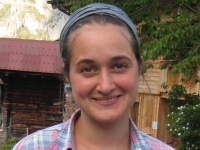 “During my time at Hohenheim, I gained a strong foothold in the world of organic farming. The Organic Agriculture & Food Systems master program is a deep dive into a multi-faceted pool: students from all over the world lend the program an irreplaceable richness and depth. My studies in Hohenheim reinforced my belief that we can change the world for the better by tending to the health of our planet while working hand-in-hand to build strong communities, sustainable economies and just societies.”
“During my time at Hohenheim, I gained a strong foothold in the world of organic farming. The Organic Agriculture & Food Systems master program is a deep dive into a multi-faceted pool: students from all over the world lend the program an irreplaceable richness and depth. My studies in Hohenheim reinforced my belief that we can change the world for the better by tending to the health of our planet while working hand-in-hand to build strong communities, sustainable economies and just societies.”
Milica Biller-Sandalj (Bosnia and Herzegovina), Graduate 2013, Adviser on Food and Nutrition Security in Togo, GFA Consulting Group / GIZ GmbH
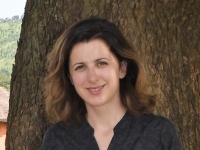 “When I look back on my master’s, I am very grateful for being able to develop my technical knowledge as well as my interpersonal skills. Essentially, the Organic program taught me a myriad of theoretical and real-life skills, be it through the fieldwork on the university field station, or in the classroom with many experienced professors and guest lecturers. Personally, the program allowed me to grow and evolve, by not limiting me in my approach to studying, just as research should do."
“When I look back on my master’s, I am very grateful for being able to develop my technical knowledge as well as my interpersonal skills. Essentially, the Organic program taught me a myriad of theoretical and real-life skills, be it through the fieldwork on the university field station, or in the classroom with many experienced professors and guest lecturers. Personally, the program allowed me to grow and evolve, by not limiting me in my approach to studying, just as research should do."
Interesting and individual career prospects
Organic farming is a growing market that needs and demands skilled workers with in-depth knowledge of organic food production, processing, and quality control.
The following professions are open to you:
- Organic food and cosmetic companies
- Trade
- Quality management and certification
- Agricultural consulting
- Non-governmental organizations and associations
- Universities and research institutions
- Certification
If you are interested in continuing to conduct research, the degree program also qualifies you for further doctoral studies.
What makes our degree program so special?
- The Center for Organic Farming is a good platform for you to get a taste of national and international research projects. It also offers you great professional networking with other departments.
- The Agricultural Experiment Station, in particular the “Kleinhohenheim” Experiment Station [https://versuchsstation.uni-hohenheim.de/standorte], is available for demonstration lessons.
- You have a wide range of modules to choose from at the Hohenheim Faculty of Agricultural Sciences, which has more than 50 professors. This gives you a broad foundation and allows you to immerse yourself in other areas.
If you have opted for the double degree, you will spend the second academic year at your host university.
If you are a single degree student, you can also include a stay abroad in the second half of your studies. The credits earned during your semester abroad can easily be recognized as elective modules. This means that spending time abroad will not typically extend the amount of time you need to complete the program.
The University of Hohenheim’s Office of International Affairs offers information and advising on stays abroad and how to finance them through scholarships.
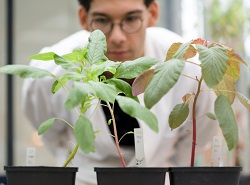
Integrating academic rigor with practical experience
As early as the first academic year, you will learn how to scientifically evaluate, assess, and formulate practical surveys in the “Organic Project.”
Gaining practical experience
You can integrate an internship, e.g., at an organic farm or a company in the organic sector, or in one of the numerous organic associations, into the degree programs by using the portfolio module as an elective module.
Expanding competences
You will find additional further education opportunities on campus in the form of the F.I.T continuing education courses, the “Artificial Intelligence and Data Science in Hohenheim” (AIDAHO) certificate, or the start-up support in the “Innovation Greenhouse.”
Learning from practice
The degree program offers you numerous opportunities for practical learning. Lectures by practitioners, projects with companies, exciting excursions, and application-oriented projects during your studies give you a direct insight into professional practice and promote your ability to actively apply the knowledge you have acquired.
Strengthening language and intercultural skills
Would you like to acquire further language skills? For this purpose, the Language Center at the University of Hohenheim offers various semester and intensive courses that you can take individually during your studies. You can even acquire the UniCert III C1 certificate as part of an elective module. During your studies, you will also acquire intercultural skills naturally by interacting with your fellow students from all over the world.
Researching during your studies
During your studies, you will have the opportunity to participate in scientific working groups and gain valuable insights into research practice. By actively participating in research projects, student research projects, and specialized research modules, you become part of the scientific process and acquire qualifications for independent scientific work. You can find research topics at: agrar.uni-hohenheim.de and oeko.uni-hohenheim.de
| Start of the application period |
|---|
| All non-EU applicants: Mid-November of previous year |
| Application deadlines | |
|---|---|
| 1st subject-related semester | Only possible for the winter semester! German, EU citizens: 1 June Non-EU citizens: 15 March |
Higher subject-related semesters | For the winter semester: All applicants: 15 January |
| Admission requirements | |
|---|---|
| Formal requirements |
|
| Language skills | English language proficiency required |
| Pre-study internship | no |
| Selection procedure | |
|---|---|
| Selection criteria |
|
| Selection interview | no |

